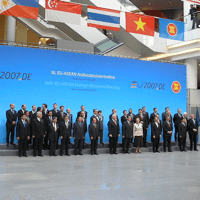The absence of the European Union from the Sixth East Asia Summit (EAS), which will be held in Bali, Indonesia, on Nov. 18-19, is a sign that the EU may play only a secondary role in what many see as the unfolding “Asian century.”
Though the EU is the longest-standing partner of the Association of Southeast Asian Nations (ASEAN), the lead organization for the EAS, EU leaders will be totally excluded from the summit, which will bring together leaders of the 10 ASEAN states, plus Australia, China, India, Japan, New Zealand, Russia, South Korea and the U.S.
This exclusion should be of major concern for the EU given the ongoing shift in global power toward Asia -- a shift already reflected in the fact that eight of the 18 members of the EAS are also the members of the G-20. Similarly, three of the four BRIC countries -- Russia, India and China -- participate in the EAS. A recent report by the Asian Development Bank, “Asia 2050: Realizing the Asian Century,” predicted that by 2050, the region could account for more than half of global output.

